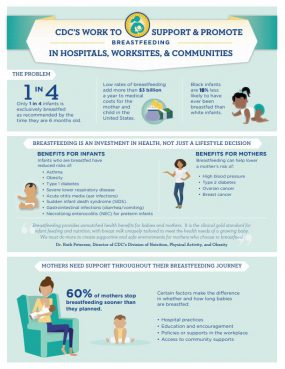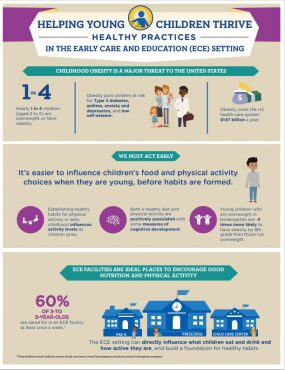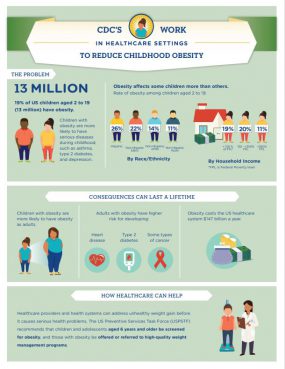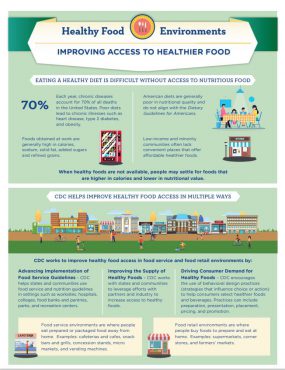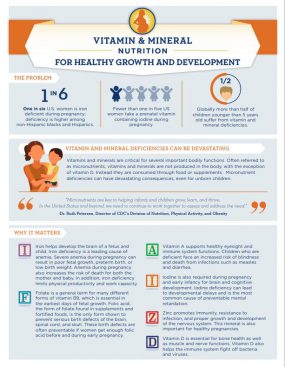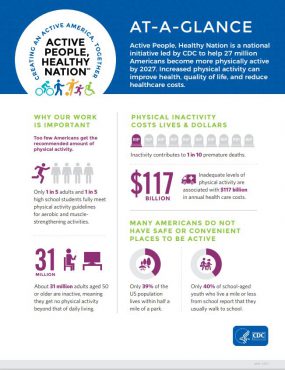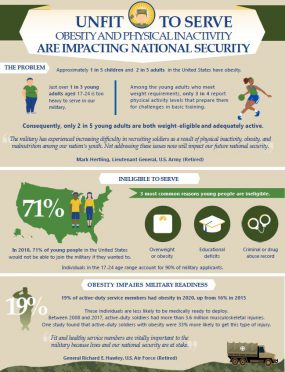Priorities
CDC’s Division of Nutrition, Physical Activity, and Obesity (DNPAO) aims to improve the overall health and well-being of all people, with a focus on promoting health equity among groups experiencing more risk factors for chronic diseases. DNPAO promotes the use of evidenced-based strategies to improve nutrition and physical activity across the lifespan: starting healthy, growing up healthy, and maintaining health through nutrition and physical activity.
Starting Healthy
DNPAO promotes and supports implementation of programs and activities to improve nutrition before pregnancy, during pregnancy, and through a child’s second birthday. This includes optimal breastfeeding and complementary feeding practices.
Improving Care for Breastfeeding Mothers and Infants
In the United States, nearly all infants are born in a hospital or birth center. The facilities’ policies and practices can impact mothers who want to breastfeed. To improve maternity care practices related to breastfeeding, we monitor maternity care practices, using the 10 steps to successful breastfeeding outlined in the Baby-Friendly Hospital Initiative (BFHI) from the World Health Organization and UNICEF. We also fund state and local programs to improve these practices.
Infant and Toddler Nutrition
Good nutrition before and during pregnancy through a child’s second birthday is vital for healthy growth and development. Starting good nutrition practices early can help children develop healthy dietary patterns. We bring together existing information and practical strategies on feeding healthy foods and drinks to infants and toddlers, from birth to 24 months of age. Parents and caregivers can explore our website to find nutrition information to help give their children a healthy start in life.
Early Care and Education
Most young children spend time in care outside of their home, making the early care and education (ECE) setting one of the best places to help children develop healthy habits for life. We work with a variety of organizations to promote ECE licensing standards that address nutrition, infant feeding, physical activity, and screen time. In addition, farm to ECE programs enrich young children’s health and lives through greater access to nutritious foods and a hands-on approach to food, health and agriculture education. By connecting local farmers and food producers with early care and education providers, farm to ECE programs stimulate local economies while promoting a sustainable food system.
Family Healthy Weight Programs
More than 14 million US children live with obesity, and obesity is more common in households with lower incomes. This is a serious public health concern. Children with obesity are at risk for poorer health, stigmatization, and bullying. With fewer resources, families with lower income may have a harder time getting their children needed health screenings and weight management support. We support three projects related to family healthy weight programs.
Childhood Obesity Research Demonstration (CORD) project began in 2011. It is now in its third phase which focuses on adapting, testing, and packaging effective programs to reduce obesity among children from lower-income families.
Childhood Obesity Management with MEND Implementation Teams (COMMIT) is a partnership with the National Association of Community Health Centers to increase implementation of an evidence-based family healthy weight program in federally qualified health centers. MEND is a weight management program known as Mind, Exercise, Nutrition, Do It!
The Clinical and Community Data Initiative (CODI) leverages existing information technology tools in innovative ways to facilitate access to obesity data across health systems and sectors. CODI addresses limited assessments of effective interventions because researchers cannot easily link health-related data stored across different health information systems.
Maintaining Health:Nutrition
DNPAO promotes and supports the availability, and access to, healthy foods and beverages. One way of doing this is supporting healthy food system initiatives, such as farm-to-education and farm-to-institution. DNPAO also provides leadership for eliminating vitamin and mineral deficiencies.
Access to Healthy Food
Having healthy food available and affordable where food is served or sold allows people to make healthier food choices. We help community leaders develop food service guidelines and apply them in settings such as schools, hospitals, and worksites. We also encourage communities to provide incentives for supermarkets or farmers’ markets to establish their businesses in areas experiencing poverty.
Vitamins and Minerals
Vitamins and minerals, also called micronutrients, are the building blocks for good health. Consequences of micronutrient deficiencies include serious birth defects, undeveloped cognitive ability, and reduced productivity. Severe micronutrient malnutrition contributes to maternal and infant deaths and childhood blindness. We are working in the United States and around the world to prevent vitamin and mineral deficiencies. For example, we monitor iodine, iron, and anemia levels among vulnerable and high-risk populations and help countries develop nutrition surveillance systems and micronutrient surveys.
Active People, Healthy NationSM: Creating an Active America Together
Physical activity provides immediate and long-term benefits, yet at least 15% of adults in all US states and territories are physically inactive. Active People, Healthy NationSM is an initiative to help 27 million Americans become more physically active by 2027. Increased physical activity can improve health, quality of life, and reduce health care costs. Physical activity also lowers the risk of various chronic diseases and eight cancers. Everyone has a role to play to increase physical activity in America. Join Active People, Healthy Nation today and learn what you can do.
Putting It Together
DNPAO funds three programs that support physical activity and nutrition across the lifespan.
State Physical Activity and Nutrition Program
State recipients implement evidence-based strategies at state and local levels to improve nutrition and physical activity.
High Obesity Program
Funded land grant universities work with community extension services in states with counties that have more than 40% of adults with obesity.
Racial and Ethnic Approaches to Community Health (REACH)
REACH is a national program to reduce racial and ethnic health disparities through local, culturally appropriate programs among persons who are Black or African American, Hispanic or Latino, Asian, American Indian, and natives of Hawaii, other Pacific Islands, and Alaska.
Building Healthy Military Communities
The nation’s armed forces depend on men and women who are fit, healthy, and able to perform at their peak on or off the battlefield. But active duty military members (service members) and potential recruits are not immune to the health problems that affect the rest of the US population, and the impact on military readiness is substantial. For example, obesity is the reason just over 1 in 3 young adults cannot serve. The Building Healthy Military Communities Toolkit helps Department of Defense service providers to better connect service members with national and state public health resources.
